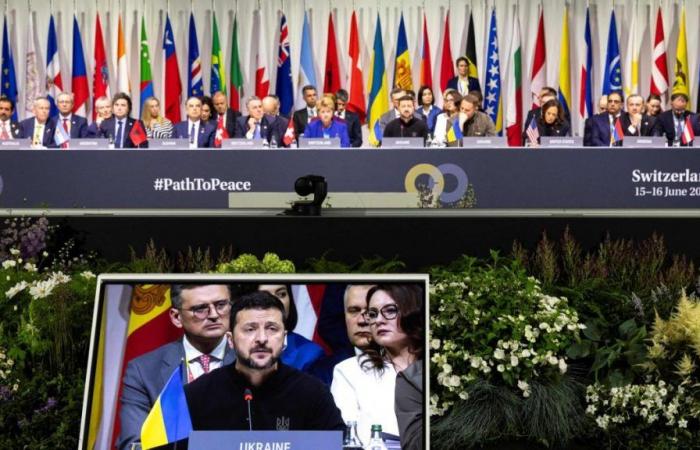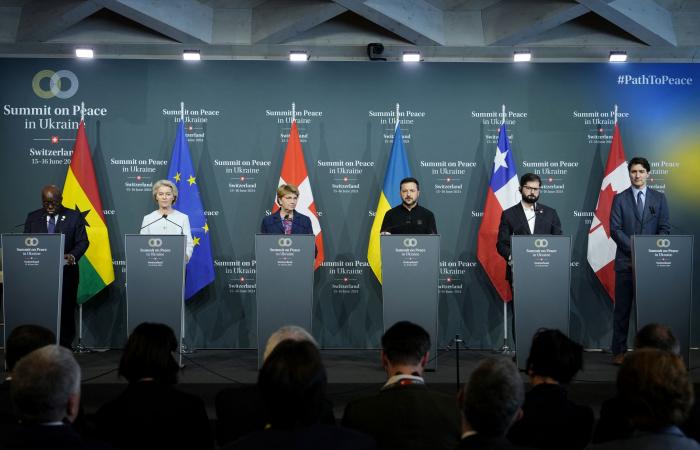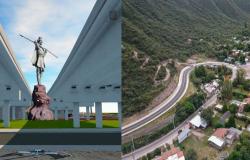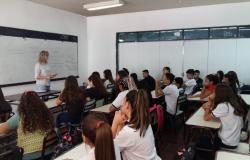Outside of the president’s visit Gustavo Petro to Sweden, within the framework of the 150 years of diplomatic relations between Colombia and the Scandinavian country, the most relevant event on the president’s agenda on his trip to Europelast week, was his participation in the Ukrainian peace summit in Switzerland. Summit that ended this Sunday and, however, on Saturday, the same day it began, The President decided to turn the helm and leave.
According to the criteria of
From Stockholm, Petro confirmed that the determination came after that the Government knew the text of the proposed declaration. This, according to the President himself, had “predetermined” conclusions that would not be to “search for paths of peace” but rather to “build blocks for war.” Hence, he returned immediately to Colombia on Saturday.
Gustavo Petro and Volodymyr Zelensky.
Photo:Presidency / EFE
“We are approaching a global conflagration. For this reason, I have decided to suspend my visit to the conference in Switzerland, because Latin America does not want more war, what it wants is the construction of peace as soon as possible,” said Gustavo Petro.
The Foreign Ministry gave greater force to the explanation this Monday: “Colombia will be part of the necessary scenarios that allow a political solution to the war and calls for recognition of the principles of international law, the United Nations Charter, the need to guarantee security conditions for all and respect for human rights for the populations of both Ukraine and Russia.”
At the meeting of leaders, one of the largest in recent decades on an extraordinary basis (outside of periodic annual meetings such as those of the G20 or the United Nations Assembly) the vast majority of the more than 90 countries represented at the Burgenstock summit gave their support to the final declaration.
It is precisely through this line that criticism and questions have come to the Government. “Where does our president (who, let us remember, represents Colombia) get that the 90 countries invited there were more interested in the continuation of the war than in the search for peace?“said the former minister and former chief negotiator with the National Liberation Army (ELN) during the government of Juan Manuel Santos, Juan Camilo Restrepo.
In the text, supports the territorial integrity of Ukraineyesand considers that Russia is responsible for starting the warthere are calls for the Ukrainian country to regain “full and sovereign” control of the Zaporizhzhia nuclear power plant and a call is made for the complete exchange of prisoners of war as well as the stability of food security.
List of countries that signed the final declaration of the summit.
Photo:AFP
Government Distancing
Despite the majority support for the document, Twelve leading developing world countries and Russia’s partners in certain forums declined to sign it.. Among those are Brazil, India and South Africa – which are part, along with Russia and China, of the group of emerging economies, known as the BRICS -, as well as Mexico. Armenia, Bahrain, Indonesia, Libya, Saudi Arabia, Thailand and the United Arab Emirates also did not join the final declaration.
The Ministry of Foreign Affairs of Colombia emphasized the previous situation as something that supports the reasons for the absence, after “A general consensus was not achieved on the final text, since a group of attending countries did not subscribe to it.“.
Closing press conference of the Ukraine Peace Summit, in the luxurious tourist complex of Burgenstock.
Photo:AFP
Even Dmitri Peskov, Russian presidential spokesman, pointed out this Monday that for the Kremlin, any initiative that seeks to end the conflict with kyiv requires Moscow’s presence in the dialogue. “If we talk in general about the result of this meeting, then, of course, it is almost zero,” he commented.
However, the declaration details in one of its points that Russia must be included in future declarations on a peace plan.
“Ultimately, the most beneficiary of this summit was Ukraine because it managed to exclude Russia from the dialogues. and agreed to security agreements with the United States. Faced with this, history has shown us that if you want peace, all parties must be present,” says Paula Ruiz, a professor at the Externado de Colombia University.
In that way, consider then that, seeing it in more strategic terms, Colombia’s non-attendance shows a distancing of the government not only with the United States, but with the West.
“Mexico, Colombia, Brazil have a common position that there cannot be peace if the war continues to be financed. “If the United States and some European countries continue to supply weapons, they will continue to prolong the conflict,” she maintains.
Camilo González, Manuel Camilo González, professor of International Relations at the Javeriana University, recalls that Colombia, along with other countries, has indeed established a position in which both parties must give in, which blurs the image of a Ukraine attacked by Moscow and moves away the road map proposed by the West and several of its allies focused on territorial integrity.
“Besides, Colombia aspires to be in the BRICS economic bloc that had two major absentees at the summit, China and Russia. This could be a reason for the Colombian government not wanting to endorse a document without one of the parties to the conflict and a power that can play as a mediator and guarantor,” he explains.
For its part, Enrique Prietoan expert in international law, states that “this is a conflict between two countries, if one wants to seek peace one must invite both parties. Saying this, it does not affect Colombia’s international position. This Government has presented itself as one that seeks international peace. In fact, raising this position is strategic so that when a space for peace occurs, Colombia can contribute its experience in transitional justice.”
Contradictory messages?
Now, analyst Ruíz affirms that one of the questions that can be asked in this case to the Colombian government and its Foreign Ministry It is around the prior confirmation of assistance, since these are diplomatic acts whose approaches are known in advance.
“Sends mixed messages and shows that Colombia was waiting for reactions from Mexico and Brazil to align itself,” Ruíz emphasizes.
Luis Gilberto Murillo, Foreign Minister of Colombia
Photo:Presidency
In the statement issued this Monday, the Foreign Ministry assures that “despite this circumstance, the National Government reiterates its willingness to support a negotiated solution that allows lasting peace to be achieved as soon as possible and offers his experience in addressing humanitarian issues to the victims of this armed conflict.”
The opposition, however, speaks of “double standards for peace.” “The double standard regarding his position on Palestine is evident. Gustavo Petro is incapable of condemning Putin’s bloody and arbitrary invasion of Ukraine. By equating the invader with his victim, the president incurs a great injustice,” said representative Andrés Forero .
In the end, and as analyst Paula Ruíz previously pointed out, Volodymyr Zelensky -with whom Gustavo Petro was going to meet in the middle of the conference- scored a diplomatic triumph by showing that support for his cause is not only European. Colombia, for its part, invited us to rethink this type of spaces.
JUAN PABLO PENAGOS RAMÍREZ
Political Journalist EL TIEMPO







